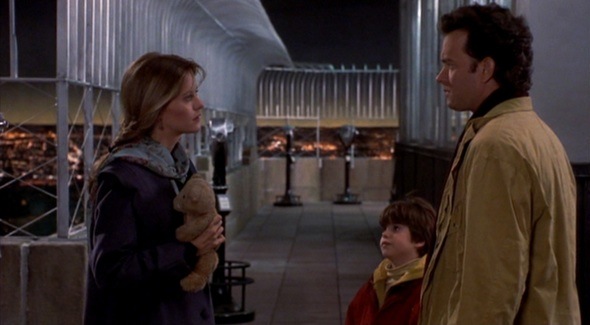
Stop me if you’ve heard this one before:
A man is on track to succeed in his career through natural talent and hard work. However, he’s also in love with a young woman. Circumstances force him to choose between his career and the woman he loves. In the end, despite uncertainty and pressure, he chooses the woman. The two of them stare fondly as the credits roll.
Which movie did I just describe? Good Will Hunting? The Family Man? Regarding Henry? If we reverse the genders, we can add Sweet Home Alabama, The Devil Wears Prada, You’ve Got Mail and a dozen others to the list. You saw it in Felicity and you saw it on Friends. You see it every time you turn on the television.
But you don’t see it in real life.
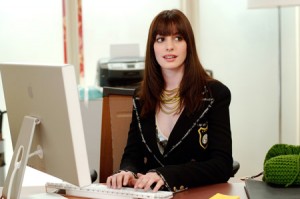
Love.
While the ballots are still being counted on why people regularly go to the movies, a popular theory is catharsis. People love watching movies because they love being exposed to larger-than-life situations and feeling emotional extremes. Aristotle introduced us to the notion of catharsis through art in his Poetics, in which a play put its protagonists through an emotional wringer and left the audience drained. While Aristotle focused on tragedy, we can see the same emotions at work in any other genre. A comedy heightens the emotion of joy. An action movie exacerbates the feeling of tension and sometimes anger: we cheer when a true bastard gets his comeuppance. A horror movie builds the sensation of fear to an unbearable clip.
By this criteria, good movies are those which engender the strongest reactions in us. Looking at the IMDb Top 250 validates this notion. While the Academy of Motion Picture Arts and Sciences or the AFI might have exacting critical standards, moviegoers always prefer the extreme, the stirring and the accessible. No film critic worth his Moleskine would call The Shawshank Redemption the greatest movie of all time. Whether that says something about the simplicity of the movie-going public or the snobbery of critics, I’ll leave to another discussion. Suffice it to say: when you ask people to list their favorite movies, they list the ones that make them feel the strongest feelings.
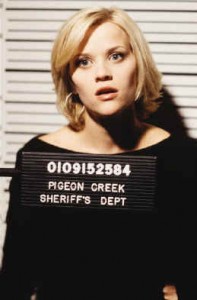
Love (NY socialite is her career, technically).
(This is also a pat explanation for the well-known “newcomer effect” on IMDb rankings, where a new movie will vault to the Top 250 early on and then settle into an established rank. We react strongly to variety; the shock of the new biases us. Even if The Dark Knight tells the same story as High Noon, we esteem it higher. The fresh evokes stronger feelings than the remembered. Unless you’re Marcel Proust)
So we can classify movies by which emotions they’re meant to stir and how strongly the movie stirs them. Comedies evoke joy (see Caddyshack). Horror films evoke fear (see The Exorcist). Action films evoke anger (see Taken). And romances, romantic comedies and most dramas evoke love. We don’t fall in love with the fictional people on screen. But we sink into that same pleasant high which being in love engenders. Tears well up in our eyes, our breath becomes tight, our chests start to ache.

Love.
Romantic movies are merely the latest medium in a tradition that dates back to the dawn of human civilization. From the myth of Pyramus and Thisbe, the correspondence of Abelard and Heloise, the epic poetry of the Roman de la Rose, the comedies of Shakespeare and the poetry of Lord Byron, we get the moral that love is a rare gift. If you come across love in the wild, you should drop everything you’re doing to pursue it. From this notion, we get tales of knights, peasants and adventurers who risk everything in order to be with someone they love. This gambit can end happily (Twelfth Night) or tragically (Tristan et Isolde), but the gambit’s always there.
I don’t intend to turn this into a discourse on whether or not True Love exists (though have at it in the comments if you like). Whether or not it exists isn’t important. What matters is that, for more centuries than we’ve had pants, artists have believed that it does. Not only that, but they’ve believed that True Love is a jewel beyond price, against which anything else – family, property, honor, community – takes a distant second. And they’ve filled the Western canon with so many works of art that support this thesis that we have profound trouble imagining it could be any other way. “What would you suggest? That someone can find the love of their lifetime and pass them by? What kind of cynic are you?”
What makes this theme of True Love interesting again is the Industrial Age.
The whole business of love, and love-making and marrying, is painted by the novelists in a monstrous disproportion to the other relations of life. Love is very sweet, very pretty […] [b]ut it’s the affair, commonly, of very young people, who have not yet character and experience enough to make them interesting. In novels it’s treated, not only as if it were the chief interest of life, but the sole interest of the lives of two ridiculous young persons; and it is taught that love is perpetual, that the glow of a true passion lasts for ever; and that it is sacrilege to think or act otherwise.
– William Dean Howells, The Rise of Silas Lapham (1885)
For the bulk of human history, the notion of “choosing a career” would have made no semantic sense. The teeming underclass worked the career they were born into, or the career their parents auctioned them off to a guild to apprentice for, or farmed. The aristocracy had pastimes (poetry, singing, hawking) and duties (service to one’s liege or to the Emperor), but didn’t have to earn a living by the sweat of their brow. And even the middle classes gained wealth in the trade they were raised in: wealthy textile traders came from the ranks of tailors, wealthy land barons from the ranks of farmers.
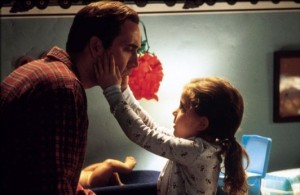
Career, then love.
The Industrial Revolution changed that. While the tide of new technology destroyed a lot of old jobs, it replaced them with a variety of new ones (read your Schumpeter, people). Dramatic increases in power meant increases in production capacity, which meant increases in goods produced, which meant the creation of new markets, which meant a need for new jobs. The world vaulted into the singularity of consumerism that it still enjoys/suffers today. The explosion of markets, combined with the startling return to democracy (the U.S., France and the zenith of the British Empire) meant a lot of people were now looking for jobs. Peasants were no longer as tied to land. Now, any healthy young lad could tie his belongings in a kerchief and strike out to seek his fortune. (Women could certainly try this as well, but it was less likely to succeed)
Only once it became possible for someone to choose a career could the dilemma of “His Career or His True Love” enter into art. And once it did, it latched on.
The problem with this dilemma, of course, is twofold. First, it’s a false dichotomy. Someone who truly loves you should be able to accept the job you work in. Failing that, if you elect to stay in your career, you can still love someone deeply without being in a relationship with them. Failing that, maybe the object of your affections could compromise a little, hm?
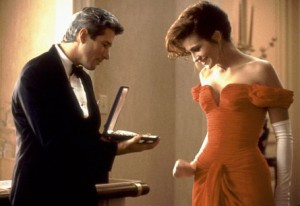
Love.
Second, and pardon your correspondent for sounding jaded, but there are things more important than love. There are. The fact that there are half as many divorcees as married couples in the U.S. suggests that it takes more than love to keep a marriage together. It takes emotional stability, a lot of patience, and the ability to provide. Money smooths over many of these hurdles. Many, many people might be better off marrying someone other than their True Love, or staying single, if marriage means abandoning a career that’ll keep them fed.
And yet the notion baffles modern audiences. You never see it in movies. Check that: you see the hero choosing his Career over his Love plenty of times, but you never see it end happily. Casablanca‘s the textbook example: Rick chooses his true calling – running guns for the Resistance – over the chance to flee Casablanca with Ilsa. In Shakespeare in Love, Viola stays with her husband (which was a noble woman’s career in Elizabethan England) rather than live in sin with the man she truly loves: William Shakespeare. Every time the hero or heroine chooses Career over Love, it is with bitter necessity and tears.
In fact, I can think of only one movie where the hero chooses Career over Love and it’s a happy, non-ironic ending: Rounders. Matt Damon plays a former poker hustler who, losing everything in a bad night of cards, falls back on his law school ambitions and the support of his girlfriend (played by Gretchen Mol). When circumstances force him to return to poker, she abandons him. At the end of the movie, he’s given up on his plans for law school and sets off for Vegas. His girlfriend forgives him and they part on understanding terms.
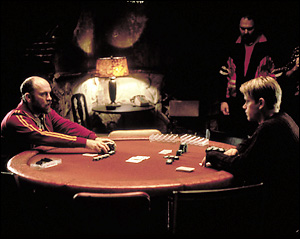
... career?
So why does the myth of Love vs Career persist? Maybe as a palliative to the drudgery of the industrial age. Maybe as the latest incarnation in the tradition of Love Vs. Whatever Else Literate People Do that has dominated art for thousands of years. Maybe because love feels good. Maybe because love is tricky. Regardless, you can say with confidence that drama will not be truly revolutionary until both sides of the scale become equally weighted.
Thousands have lived without love; not one without water.
– W.H. Auden, “First Things First”
I think it’s just a variation on the “Who You Should Love” vs. “Who You Do Love” theme that’s been around forever. Only in modern American culture we have the idea of being married to your job. The career stands in for the second entity vying for your love and we buy it.
Really, I think framing it as Love vs. Career is wrong. It’s really Love vs. Love.
Well, if that cathartic cinema is so popular, is it because of its placebo properties? I think that’s a big part of it (and certainly not all of the thing, but that’s another story). It gives our lives small pieces of that we only dream of and that possibly we’d reject or be dissapointed with if we’d really have.
Not just love I’m thinking of but also justice (considering the many and various ideas of justice and love floating around, to each his own), since both appear to succeed quite more often in fiction.
“Thousands have lived without love; not one without water”. Some may argue here, as they have in many other times and places (romantic fundamentalists perhaps?) that living without love is mere survival. I cannot agree or disagree, maybe I haven’t loved, I’m cynical or just a fool, with which I’m cool.
As for Rick from “Casablanca”, it is a nice example but we should keep in mind its propaganda value, it was filmed during the first half of the war, right?.
And I’d like to point out (in another uneeded digression) that the first lines in “Pretty Woman” before the movie fades in are: “Broke in right on the two of them”, “No matter what they say, it’s all about money”. Isn’t that fun?
An interesting take. I am inclined to disagree to a point, but maybe it’s because I’ve been drinking the romcom koolaid.
Certainly the aspect of being able to earn a living and thereby provide food and housing (which are more necessary to humans than love, really) is a good thing. (And I would definitely not argue the point that you need more than love, considering I’m watching two friends divorce in large part because of the persistent financial problems they’ve had.) Yet at the same time, in a movie context, the career is often more than just a way to earn a living.
A career can represent a way that the character feels fulfilled, often by gaining or attempting to gain the attention/respect of others. “Once I get this promotion, my life will be set, everything will be secure, I’ll have proof that people respect me, and THEN I will be happy.” The introduction of love into the equation upsets their plans, not because earning a living is a Bad Thing ™, but because they begin to realize that, even if they do attain their goal, they’re not necessarily going to be happy. This could be because they realize they’ve set their goal based on the approval of others, which they may find they don’t need as much once they realize they have found someone who loves them deeply even though they haven’t already attained that goal. They may also realize that, well, if you keep putting off being happy, when will you ever achieve it?
I know in my own life, it can be easy for me to get caught up in that latter kind of trap. I will be happy when I get the promotion. I will be happy when the new person starts. I will be happy when I get a dog. Etc etc etc. Yet, I never really stop to enjoy the moment, to just be content where I am, with who I am, and with what I’m doing. (Or to think about things and realize that, if I’m not happy now, I won’t really be just because of a largely superficial change. Especially if that change is going to mean more hard work will be required, which is often what promotions really mean.)
@Tom: an interesting take. But I asserted that “Love vs Career” was merely the latest in a long line of “Love vs. X” we’ve seen in romantic art throughout history (Love vs. Religious Faith, Love vs. Loyalty to one’s Liege, Love vs. Fidelity). Are you suggesting it’s something new and entirely different? I’m sympathetic to the argument, but I’d like to hear more from ya.
“While the Academy of Motion Picture Arts and Sciences or the AFI might have exacting critical standards”.
I might put in a more substantive and more on-topic comment later, but I couldn’t let this pass. The Academy of Motion Picture Arts and Sciences does NOT have exacting critical standards when it hands out its awards. These are awards given by the industry to the industry. The inability to see this has caused quite a bit of confusion!
/rant
I have a hate/hate/love relationship with romantic comedies. They are the puffed corn of snacks.
The extra hate/ part comes from the fact that they are not romantic comedies. For those of you that have seen the Southwest architectural style called “ranch style”, it’s the architectural equivalent. Just as those houses are cookie-cutter dumbed down versions of a ranch style, so are these comedies dumbed down versions of romance.
Romance and romanticism is the dark underbelly of life. The wiki entry does a phenomenal job of capturing the feel. Here’s a money quote, “The movement validated strong emotion as an authentic source of aesthetic experience, placing new emphasis on such emotions as trepidation, horror and terror and awe—especially that which is experienced in confronting the sublimity of untamed nature and its picturesque qualities, both new aesthetic categories.” The only thing dark about Sleepless in Seattle was the weather.
The idea that Pretty Woman is the epitome of romantic comedies is claptrap. (claptrap: Pretentious, insincere, empty language a.k.a BULLSHIT). Rounders is a solid example of romanticism, greed, loss, self-doubt, very personal, very intimate emotions. Along the way, lust and irrationality got co-opted into romantic comedy.
I hate to muddy the waters, but for the sake of this post it must be done. Gothic era love is more close to romanticism then romantic comedies are. Twilight is NOT, I repeat, NOT romantic. It’s teenage angst plus smitten love. Bram Stoker’s Dracula, that’s romantic.
The two masks of drama are comedy and tragedy. Unfortunately, we have perverted them into drama for emotional lizard brain’s sake of comedy and the tragedy of not making a lot of money.
/end rant
@Darin
I definitely agree that Pretty Woman is terrible, and that Twilight is not romantic (there’s a lot I could say about Twilight), but I don’t think it is fair to say that for a romantic film to be effective it has to have the elements of the Romantic movement. There is some overlap, but I would challenge the idea that darkness is required to make a good romance (using the article’s standards of catharsis). Personally, I didn’t find The Sorrows of Young Werther to be an effective romance at all, even though in some ways it is the epitome of Romanticism.
That’s not to say I think the romantic comedy genre is great. I tend not to. Some work, some don’t. But I don’t think it’s fair to use the Romantic movement as the measuring stick for the quality of romantic comedies.
OK, having read the whole piece, I agree that in terms of post-industrial “careers” (usually meaning 9 to 5 jobs that you commute to), its a silly choice.
Becoming an executive at a Hollywood studio is a dubious enough proposition by itself, its a terrible idea to sacrifice marriage to someone you really want to spend most of your life with. But why should modern careers constitute a barrier to romance? Only a career as a Catholic priest is incompatible with marriage.
A potential mate that wants you to change your career, I’m assuming your career isn’t something like being a pimp, shows a degree of control-freakiness and inflexibility that would likely carry over into other areas. Its better to stay away. On the other hand, jobs that require you to spend all your time on the road or at the office, leaving no time for romance, are bad situations even without the romantic complication.
There are situations where one person in a couple might have to give up their career, for example the relationship could involve someone moving, but in a succesful relationship the couple should be able to come to a decision on who does this, certainly with insufficient angst to make material for a romantic comedy.
“For the bulk of human history, the notion of “choosing a career” would have made no semantic sense. The teeming underclass worked the career they were born into, or the career their parents auctioned them off to a guild to apprentice for, or farmed. The aristocracy had pastimes (poetry, singing, hawking) and duties (service to one’s liege or to the Emperor), but didn’t have to earn a living by the sweat of their brow. And even the middle classes gained wealth in the trade they were raised in: wealthy textile traders came from the ranks of tailors, wealthy land barons from the ranks of farmers.”
And of course this is different. You you define career as “calling” or “path in life”, having to abandon it for romantic love creates real difficulty. You still see this with some careers in pre-industrial professions, for example the concept of the “army wife” who essentially marries the institution when she marries the soldier, or “vicar’s wife” (leaving aside the situation with priests who can’t marry at all) is very real. Someone marrying a farmer who remains a farmer, would actually have go to live on a farm.
This may be why post-industrial romances often seem very shallow compared their pre-industrial counterparts.
I can see quite clearly in my own family the Love vs Career going on, as my brother has devoted too much of his time to running his own business, and is leaving his family a bit in the lurch. He’d love to have his own business, but part of being in a relationship is actually seeing the person you’re married too.
I find it funny how often in Romantic Comedies, the solution is often “Lets open our own business, rather than continue in a soul sucking corporate job”. That’s a really deluded message, and frankly, unless you have your family right there running your biz with you, they aren’t going to be seeing much of you. Its one of the things I’ve both liked and disliked in Jude Apatow’s comedies, that going for the girl invariably leads to a career change, and its usually the biz owner/self employed direction. Granted, it means that the person is properly expressing themselves, but it’d be funny when the 40 Year Old Virgin realizes he sold all his fun toys to get an 80 hour a week job, if not more.
@Ed: “You still see this with some careers in pre-industrial professions, for example the concept of the “army wife” who essentially marries the institution when she marries the soldier, or “vicar’s wife” (leaving aside the situation with priests who can’t marry at all) is very real.”
That’s pretty compelling! Good stuff.
(I’ve come down off my rant even though I still think it’s valid.)
The reason that the Love vs. Career persists, unfortunately, is not worth overthinking. It’s easy, Hollywood-style. It’s a formula that we can obviously see that makes money as we have shown. The career is the antagonist that everyone can relate to, easy to hate. There is a boss that plays to type that everyone can relate to. We connect quickly with the protagonist, trying to make a living and usually raise a child as a man, or trying to maintain my esteem/independence/success as a woman. The protagonist is offer a conflict that we can all root for and all know they’ll succeed at. Easy fight, easy winner, easy warm fuzzies.
I have to love any argument that combines the concept of “true love” with a historical analysis of social class. Nevertheless…I feel the need to disagree on a couple of points.
You have chosen, in my opinion, fairly awful examples of the true love/romcom genres. But leaving that aside, I will address those examples.
The Devil Wears Prada: I may be biased from having read the mediocre book but I think the struggle here is separate from love and career. It is about how much the main character is willing to do to achieve her ends. By returning to her boyfriend in the end (which does not happen in the book) she is still pursuing a career, and arguably more effectively (instead of hoping magazine editor lackey will launch her into her chosen career).
Pyramus and Thisbe: They ignored their parents’ disapproval.
Twelfth Night: Viola defies societal norms and risks dishonor.
And given one of the possible origins of Twelfth Night, these stories are less about dropping everything for love and more about pursuing a relationship that is being blocked by society after it has already blossomed.
I’m wandering awkwardly to a point, which is…perhaps it isn’t Career vs. True Love but more of a Societal Perception vs. True Love.
“First, it’s a false dichotomy. Someone who truly loves you should be able to accept the job you work in.”
-I think often it’s less about the person you love being able to accept the job you work in and the strain of being able to sustain the level of success in work and a healthy relationship simultaneously. These characters usually are businesspeople, architects…not tea cozy knitters. They opt for jobs that are less taxing but don’t necessary mean they fall into financial hardship or aren’t pursuing careers they enjoy. These significant others are similar to the “manic pixie dreamgirls” who change the protagonist’s life for the better.
Hate to say it, but as for the divorce statistics, not everyone who gets married is in love. Minor point.
Shakespeare in Love: It seems to be much more about conforming to society’s norms, expectations, and notions of honor than choosing career over love. One could also see her as making a sacrifice for his career…but then wouldn’t that mean choosing love because she chose unhappiness to protect him and allow him to pursue his career?
Thank you for reading all of my rambling.
I’m going to present myself as a counterexample, the exception that proves the rule.
Just kidding about that last part… I put it in there to annoy Wrather.
Seriously, though, I had a career I quite liked when I met and fell in love with my wife. I moved to be with her, and have not been able to find a stable job in the field since. Do I regret my choice? Not one little bit.
Now, our life hasn’t quite played out like in the movies, but I’ll likely end up a barrista or the equivalent next year, which will put my post graduate degrees to great use, I’m sure. I suppose I could move to another state where I’m more likely to find work in my chosen field, but that would mean not being near my wife.
So in at least one case, life is actually sorta like the movie. The difference being that in the movie, when the career person gives up their career as a lawyer or investment banker, they find a DIFFERENT fulfilling career as a teacher or a park ranger. I gave UP a career as a teacher, and will probably end up with a McJob. So I guess there is some difference there.
You talk about catharsis, but I think there’s also another element here: fantasy. Part of seeing Love vs. Career or any romantic movie is the element of fantasy. It is specifically NOT like real life, which provides a lot of the draw. So if we’re talking about catharsis and escapism, seeing the exact opposite of real life play out or, rather, seeing the choice of true love before seeing the consequences of choosing true love (now where will I work?) provides the escapism and fantasy of Happily Ever After.
Just chiming in with a “well, actually…” here: what we have of Aristotle’s “Poetics” does indeed focus on tragedy, but we’re pretty sure that there is a lost part of it that talked about comedy. (I think it says right in the text that he’s going to talk about both of them.) A great many of his works have been lost to time, for pretty much the usual reasons.
If we are focusing on the film as a parallel to real life, then I offer this…what’s the point of the successful career/making lots of money if you have no one to share it with? This is what I find as one of the main points in the either/or world of romcom, the message being that material wealth is inherently empty and even though you may be poor, you’ll at least be poor together. Family Man is a good example of this. Debate if you will, and I do agree that in the real world money problems often trump love, but movies only have about 2 hours to tell their story, and to leave audiences feeling good about what they saw they often end with “we found each other, and we’ll just work out the easier part of paying rent later”.
Now, I’m equating “career” with “money” above. However, if the job is more about personal fulfillment or making a difference in the world, then compromises should be made in real life, but again the movies usually have to end up on one side or the other.
I know this post is from weeks ago, now, but I just read it and I have one question:
How can you write a post titled For Love or Money and not even once reference For Love or Money?
@marion: We have a strict policy against Fyvush Finkel references on this site.